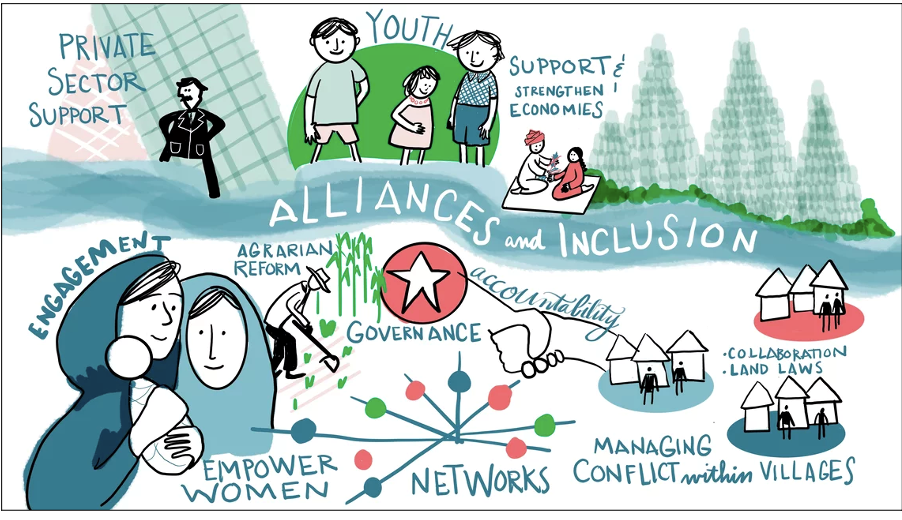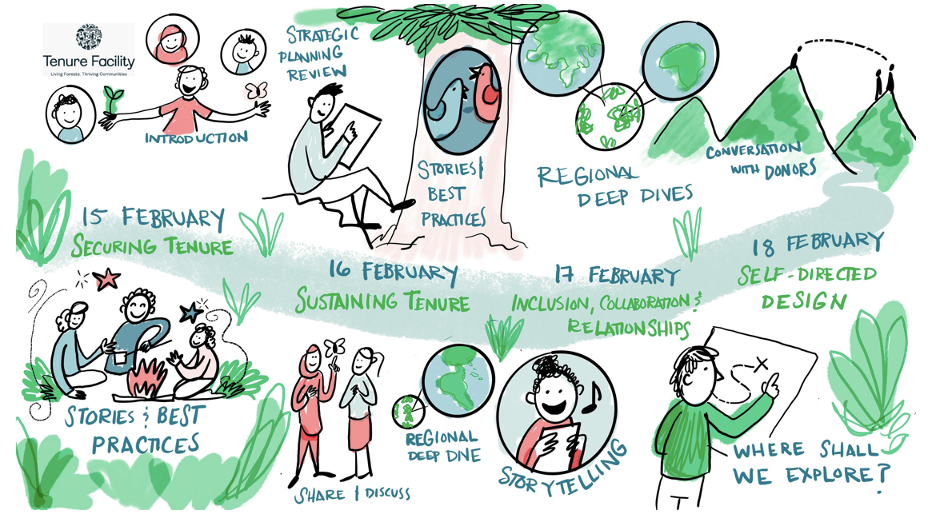Faced with increasingly tight budgets, governments have tended to promote mining, oil and gas drilling, industrial logging, and large-scale agriculture to achieve shortterm economic growth, often at the expense of the communities´ rights. This was particularly the case in areas where Indigenous Peoples have not yet secured legal tenure to their lands. Ranged against this, however, was the resilience shown by indigenous communities and supporting organisations: they have raised their voices, built fresh alliances, found new ways to work with companies and governments, and harnessed their ingenuity to find their way forward. With this as a backdrop, the Tenure Facility hosted the 2022 Learning Exchange from February 15-18, bringing together partners to ask some simple questions: What worked? What did not work? What has changed? What might work in the future?
At issue, of course, is human rights. Indigenous Peoples and local communities have the right to decide what happens on their own land. But getting there requires constant work. As Tenure Facility Executive Director Nonette Royo has said: “The big challenge is how to meaningfully work together, build capacity, advance rights-based approaches and learn from a wider network of allies who are out there and are different but keen to help.”
"“The big challenge is how to meaningfully work together, build capacity, advance rights-based approaches and learn from a wider network of allies who are out there and are different but keen to help.”"

The Learning Exchange brought together more than 150 people each day and featured regional sessions for Latin America, Africa, and Asia. It allowed for different actors to talk about how they have been securing tenure in their local contexts.
In Nepal, for example, Tenure Facility partners such as the Federation of Community Forestry Users Nepal is working with local governments to secure local forest acts under the auspices of the country’s 2015 Constitution. Meanwhile in Guyana, another partner, the Amerindian Peoples Association, has been helping and sometimes mediating between local communities to delineate their lands to present the government with needed data from the field. Once achieved, sustaining tenure is equally important. Partners from India, Indonesia, Liberia, Panama, and Peru presented the Learning Exchange with stories about how land with secure tenure is being used to provide income while simultaneously preserving biodiversity and forests.
There is, for example, a “Homecoming Movement” in Indonesia which has seen indigenous youth returning to their traditional villages where they have set up schools, developed organic farms, and even created eco-tourist destinations. One day’s discussions were focused on how to build alliances and broaden inclusion. Guatemala focused on women’s empowerment and gender issues, Indonesia on the youth movement, Liberia on relations with the government, and Mali on managing conflict. Money is a key factor to obtaining tenure.

The discussions took place only a few months after 11 countries and the European Union agreed a $12 billion “Global Forest Finance Pledge”, part of which will be used for clarifying land tenure and forest rights for Indigenous Peoples and local communities. A group of these countries also joined with private foundations to pledge an initial $1.7 billion of financing through 2025. This fund will support the advancement of Indigenous Peoples’ tenure rights and provide greater recognition and rewards for their role as guardians of forests and nature.
Overall, the Learning Exchange underscored the importance of tenure as the bedrock for Indigenous Peoples and local communities to ensure their self determination. Participants agreed that security of tenure comes from strong governance, effective dispute resolution, monitoring, legal defence, natural resource management, and sustainable livelihoods.
Learning Exchanges